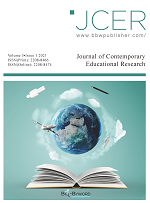Abstract
Listening has been considered as the most important language skill by many researchers but in Chinese context it has been overlooked for years. The Foreign Language (FL) listening problems gradually reveal when students attend to the Listening Course in universities or colleges. This paper at first illustrates the importance of listening in foreign language learning and provides a discussion on the top-down and bottom-up processes with the analysis of Anderson’s three-model of language comprehension [9] as well as the factors affecting listening comprehension in Foreign Language in general, aiming at the illustration of the necessity on one of the bottom-up processes - the Spoken Word Recognition (SWR). The analysis of two issued official guiding documents for Chinese university students and the current situation of English listening teaching in Chinese universities are followed, providing a general background on English listening teaching in Chinese context. Three possible foreign language listening problems and their causes are proposed, followed by the pedagogical suggestions to EFL learners who are improving their listening skills and instructors who are advancing their teaching procedures.
References
Bailey KM, 2018, Teaching Listening and Speaking in Second and Foreign Language Contexts. Bloomsbury Academic. London.
Flowerdew J, Miller L, 2005, Second Language Listening: Theory and Practice. Cambridge University Press, Cambridge.
Newton JM, et al. 2018, Teaching English to Second Language Learners in Academic Contexts: Reading, Writing, Listening, and Speaking. Routledge, London.
Field J, 2008, Listening in the Language Classroom. Cambridge University Press, Cambridge.
Kurita T, 2012, Issues in Second Language Listening Comprehension and the Pedagogical Implications. Accents Asia, 5(1), 30-44.
Rost M, 2011, Teaching and Researching Listening. 2nd edn. Longman, Harlow.
Vandergrift L, Goh C, 2012, Teaching and Learning Second Language Listening. Metacognition in Action. Routledge, New York.
Vandergrift L, 2007, Recent Developments in Second and Foreign Language Listening Comprehension Research. State of Art Article. Language Teaching, 46(3), 191-210.
Anderson JR, 2009, Cognitive Psychology and its Implications. 7th edn. Worth Publishers, Macmillan.
Goh C, 2000, A Cognitive Perspective on Language Learners’ Listening Comprehensive Problems. System, 28, 55-75.
Vandergrift L, 2011, Second Language Listening: Presage, Process, Product, and Pedagogy. In Hinkel E, (Ed.) Handbook of Research in Second Language Teaching and Learning, Routledge, London, 2: 455-471.
Bloomfield A, et al. 2010, What Makes Listening Difficult? Factors Affecting Second Language Listening Comprehension. Maryland Univ College Park.
Hansen C, Jensen C, 1994, Evaluation Lecture Comprehension. In: Flowerdew J, (Ed.), Academis Listening. Cambridge University Press, Cambridge, 241-268.
Schmidt-Rinehart BC,1994, The Effects of Topic Familiarity on Second Language LC. The Modern Language Journal, 78, 179-189.
Pemberton R, 2004, Spoken Word Recognition in a Second Language: An Investigation of the Ability of Hong Kong Learners to Recognize the Most Frequent Words of English When Listening to News Broadcasts. Language Centre, The Hong Kong University of Science and Technology, HK.
Cutler A, 2000, Listening to a Second Language Through the Ears of a First. Interpreting, 5(1): 1-23.
College English Curriculum Requirements (For Trial), viewed 06 August 2021, http://www.moe.gov.cn/srcsite/A08/s7056/200401/t20040130_110837.html
China’s Standards of English Language Ability (CSE), viewed 06 August 2021, http://www.moe.gov.cn/srcsite/A19/s229/201804/t20180416_333315.html
Yang H, Zhao J, 2018, Multiculturism and Contemporary English Teaching. Tianjin Science and Technology Press, Tianjin.
Rost, M., 2002, Teaching and Researching Listening. Longman, Harlow.
Field J, 2009, Listening in the Language Classroom. Cambridge University Press, Cambridge.
Goh C, 1999, How Much Do Learners Know About the Factors that Influence Their LC? Hong Kong Journal of Applied Linguistics, 4(1): 17- 39.
Gao LP, 2008, Bottom-Up Speech Recognition: An Investigation into the Impact of the Ability to Recognize the Frequent Words of English on Listening Comprehension for Chinese College Students at Intermediate and Upper-Intermediate Proficiency Levels. (MA Dissertation). University of Nottingham, Nottingham.
Pemberton R, 2009, Acting on a Hunch: Can L1 Reading Instruction Affect L2 Listening Ability? In: T. Fitzpatrick,. & A. Barfield. (Eds), Lexical Processing in Second Language Learners. Multilingual Matters, 141-153.
Brown G, 1990, Listening to Spoken English. 2nd edn. Longman, London.
Dahan D, Magnuson JS, 2006, Spoken Word Recognition. In Handbook of Psycholinguistics. Academic Press. 249-283.
Leech G, Rayson P, Wilson A, 2001, Word Frequencies in Written and Spoken English. Longman, Harlow.
Pranoto BE, Afrilita LK, 2018, The Organization of Words in Mental Lexicon: Evidence from Word Association Test. Teknosastik, 16(1), 26-33.
Jensen ED, Vinther T, 2003, Exact Repetition as Input Enhancement in Second Language Acquisition. Language Learning, 53(3), 373-428.
